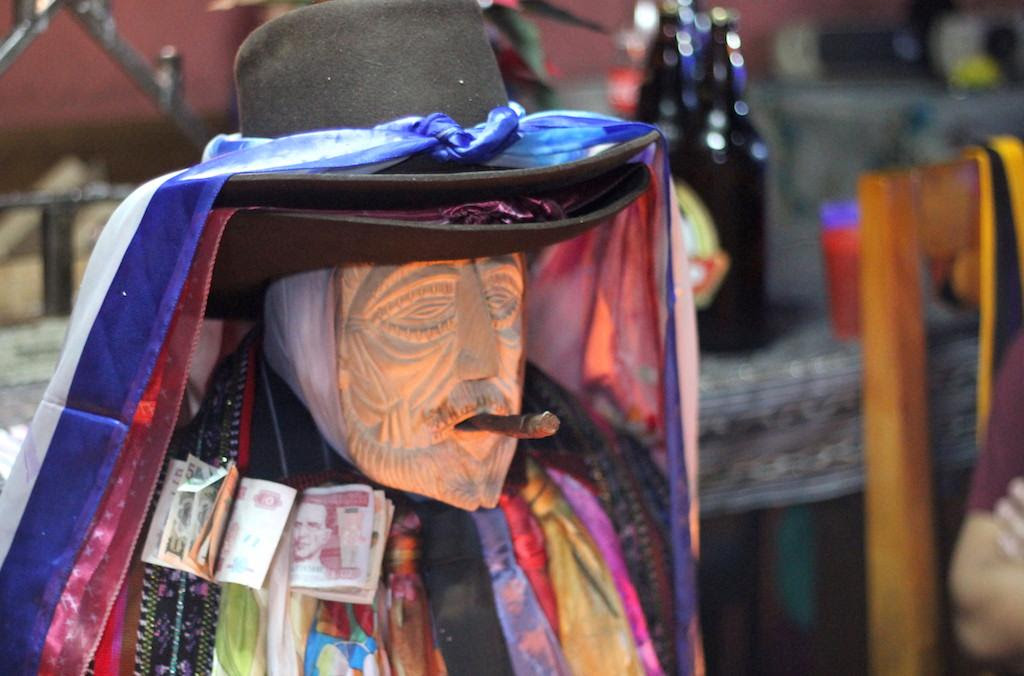| Acts 8: 1 – 24 When in Guatemala some years ago my cousin Jeff and I sought out the enormous shrine to Maximón, a folk-saint worshipped in the Guatemalan highlands and at a smaller shrine on the island of Santiago on Lake Atitlán. Associated with the Mayan diety of the underworld Ma’an, Maximón is said to provide wealth and success, fertility and prosperity. He assists in matters of the heart, sexual conquest and infidelity. A range of colored candles indicate the petition one brings before him. Maximón has no arms or legs, having lost them in a sexual mis-adventure of his own, and is dependent on his priests, both men and women, to keep his cigar lit and his glass full of strong drink. The attendants are themselves drunk by early morning, as they fill their mouths with pulque or mezcal or whatever is at hand to spit on supplicants. My cousin and I mostly stayed out of the way of the spray when visiting the shrines of this diety. Magic is the attempt to control divine powers through the application of certain techniques or esoteric formulae. The Book of Acts has a uniformly low-opinion of these practices, embodied in the person of Simon the Magician, who, impressed by the power flowing from the apostles, converts to Christianity and seeks to pay for similar powers. Simon may have been a trickster practicing slight of hand in his previous life, or perhaps he believed in magic arts. I had a long conversation with a Mexican friend not long ago about how, though of course he didn’t believe in it, he did periodically visit a curandero, who, tracing patterns on his body with a roasted egg and various burning herbs, did perhaps successfully remove various evil spells and curses. This was a fascinating glimpse into the prevalence of syncretism in my new hometown. I wonder, is this so very different than American fundamentalists who follow the so-called prosperity gospel, fusing materialism to religion? Mark Twain’s Huckleberry Finn once said he had tried prayer and found that it did not work. He had placed a shoe box under his bed and prayed that it be filled with gold, but in the morning the box was still empty. The apostles encounter folk-magic and folk-religion throughout the Book of Acts. People fuse all sorts of beliefs into structures perceived as useful. We are not nearly so rational as we imagine; witness our current willingness to accept fake news on a host of subjects, and to embrace wild preventatives against coronavirus. The Russians really didn’t have to work all that hard to mess with American democracy. ‘The Irrational Ape’ by David Grimes is a terrific read, and all of us should be subjecting our Facebook gleanings to review on the fake-news detector site Snopes.com The world is rife with frauds and tricksters. Simon, anyway, tries to make an honest man of himself by the end of today’s reading. His conversion is a process, as conversions always are. We are not purely rational beings and a bit of magical thinking will always be mixed into our sound and healthy faith, so we ought always to be sifting ourselves. Maximón and friends are not unique to Guatemala, though they shape-shift to accommodate local circumstance. Grace and peace, The Reverend Canon George F. Woodward III For Schools and Colleges “O Eternal God, bless all schools, colleges and universities, that they may be lively centers for sound learnig, new discovery, and the pursuit of wisdom; and grant that those who teach and those who learn may find you to be the source of all truth; through Jesus Christ our Lord. Amen.” The Book of Common Prayer page 824 Previous Reflections may be found on the parish website StPaulSMA.com under ‘Blogs’ here. YouTube postings are available here. Previous editions of THE EPISTLE can be found here. |

| St. Paul’s Anglican Church Calzada del Cardo, 6 Centro 37700, San Miguel de Allende, Mexico 415.121.3424 www.StPaulSMA.com |
